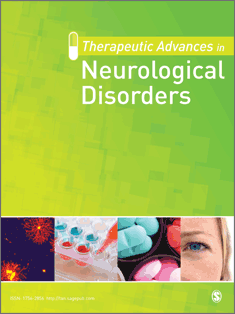Efficacy and safety of rozanolixizumab in patients with muscle-specific tyrosine kinase autoantibody-positive generalised myasthenia gravis: a subgroup analysis of the randomised, double-blind, placebo-controlled, adaptive phase III MycarinG study.
IF 4.7
2区 医学
Q1 CLINICAL NEUROLOGY
引用次数: 0
Abstract
Background Muscle-specific tyrosine kinase (MuSK) autoantibody-positive (Ab+) generalised myasthenia gravis (gMG) is a rare and frequently severe subtype of gMG. Objectives To assess the efficacy and safety of rozanolixizumab in the subgroup of patients with MuSK Ab+ gMG in the MycarinG study. Design A randomised, double-blind, placebo-controlled phase III study. Methods Patients with acetylcholine receptor (AChR) Ab+ or MuSK Ab+ gMG (aged ⩾18 years, Myasthenia Gravis Foundation of America Disease Class II-IVa, Myasthenia Gravis Activities of Daily Living [MG-ADL] score ⩾3.0 [non-ocular symptoms], Quantitative Myasthenia Gravis score ⩾11.0) were randomly assigned (1:1:1) to receive once-weekly subcutaneous infusions of rozanolixizumab 7 mg/kg, rozanolixizumab 10 mg/kg or placebo for 6 weeks, followed by an 8-week observation period. Randomisation was stratified by AChR and MuSK autoantibody status. The primary study endpoint was change from baseline to Day 43 in MG-ADL score. Treatment-emergent adverse events (TEAEs) were also assessed. Results Overall, 200 patients were randomised, of whom 21 had MuSK Ab+ gMG and received rozanolixizumab 7 mg/kg (n = 5), 10 mg/kg (n = 8) or placebo (n = 8). In patients with MuSK Ab+ gMG, reductions from baseline to Day 43 in MG-ADL scores were observed: rozanolixizumab 7 mg/kg least squares mean (LSM) change (standard error), -7.28 (1.94); 10 mg/kg, -4.16 (1.78); and placebo, 2.28 (1.95). Rozanolixizumab 7 mg/kg LSM difference from placebo was -9.56 (97.5% confidence interval: -15.25, -3.87); 10 mg/kg, -6.45 (-11.03, -1.86). TEAEs were experienced by four (80.0%), five (62.5%) and three (37.5%) patients with MuSK Ab+ gMG receiving rozanolixizumab 7 mg/kg, 10 mg/kg and placebo, respectively. No patients experienced serious TEAEs. No deaths occurred. Conclusion This subgroup analysis of adult patients with MuSK Ab+ gMG enrolled in the MycarinG study supports the use of rozanolixizumab as an effective treatment option for patients with gMG who have MuSK autoantibodies. Trial registration ClinicalTrials.gov: NCT03971422 (https://clinicaltrials.gov/study/NCT03971422); EU Clinical Trials Register: EudraCT 2019-000968-18 (https://www.clinicaltrialsregister.eu/ctr-search/trial/2019-000968-18/GB).罗扎尼单抗对肌肉特异性酪氨酸激酶自身抗体阳性全身性肌无力患者的疗效和安全性:随机、双盲、安慰剂对照、适应性 III 期 MycarinG 研究的亚组分析。
背景肌肉特异性酪氨酸激酶(MuSK)自身抗体阳性(Ab+)泛发性重症肌无力(gMG)是重症肌无力的一种罕见且常见的严重亚型。目的评估MycarinG研究中MuSK Ab+重症肌无力亚组患者使用罗扎尼单抗的疗效和安全性。方法乙酰胆碱受体(AChR)Ab+ 或 MuSK Ab+ gMG 患者(年龄 ⩾18 岁,美国肌无力基金会疾病分级 II-IVa,肌无力日常生活活动[MG-ADL] 评分 ⩾3.0[非眼部症状],肌无力定量评分 ⩾11.0),随机分配(1:1:1)接受每周一次的罗扎尼单抗 7 mg/kg、罗扎尼单抗 10 mg/kg 或安慰剂皮下注射,为期 6 周,然后进行为期 8 周的观察。随机分组按 AChR 和 MuSK 自身抗体状态进行。主要研究终点是MG-ADL评分从基线到第43天的变化。结果总计有200名患者接受了随机分组,其中21名患者的MuSK抗体+ gMG,他们分别接受了罗扎尼单抗7毫克/千克(5例)、10毫克/千克(8例)或安慰剂(8例)治疗。在 MuSK Ab+ gMG 患者中,观察到 MG-ADL 评分从基线到第 43 天的降低:罗扎尼单抗 7 毫克/公斤最小平方均值(LSM)变化(标准误差)为 -7.28 (1.94);10 毫克/公斤为 -4.16 (1.78);安慰剂为 2.28 (1.95)。罗扎尼单抗 7 毫克/公斤 LSM 与安慰剂的差异为-9.56(97.5% 置信区间:-15.25,-3.87);10 毫克/公斤为-6.45(-11.03,-1.86)。接受罗扎尼单抗 7 毫克/千克、10 毫克/千克和安慰剂治疗的 MuSK Ab+ gMG 患者中,分别有 4 人(80.0%)、5 人(62.5%)和 3 人(37.5%)出现了 TEAE。没有患者出现严重的TEAEs。结论这项对参加MycarinG研究的MuSK抗体+ gMG成年患者进行的亚组分析支持将罗扎尼单抗作为一种有效的治疗方案,用于治疗存在MuSK自身抗体的gMG患者:NCT03971422 (https://clinicaltrials.gov/study/NCT03971422); EU Clinical Trials Register:EudraCT 2019-000968-18 (https://www.clinicaltrialsregister.eu/ctr-search/trial/2019-000968-18/GB).
本文章由计算机程序翻译,如有差异,请以英文原文为准。
求助全文
约1分钟内获得全文
求助全文
来源期刊

Therapeutic Advances in Neurological Disorders
CLINICAL NEUROLOGY-
CiteScore
8.30
自引率
1.70%
发文量
62
审稿时长
15 weeks
期刊介绍:
Therapeutic Advances in Neurological Disorders is a peer-reviewed, open access journal delivering the highest quality articles, reviews, and scholarly comment on pioneering efforts and innovative studies across all areas of neurology. The journal has a strong clinical and pharmacological focus and is aimed at clinicians and researchers in neurology, providing a forum in print and online for publishing the highest quality articles in this area.
 求助内容:
求助内容: 应助结果提醒方式:
应助结果提醒方式:


